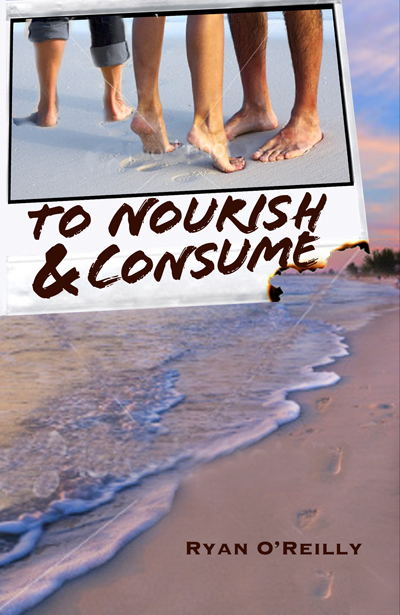 Welcome Ryan C. O’Reilly, author of To Nourish and Consume, a compelling story of going home again in order to reconcile your past so that you can embrace your future.
Welcome Ryan C. O’Reilly, author of To Nourish and Consume, a compelling story of going home again in order to reconcile your past so that you can embrace your future.
The Responsibility of Writing
by
Ryan C. O’Reilly
The first question I ask myself when setting out to write a novel – or to, as Douglas Adams said, put one hundred thousand words in a cunning order – is why am I writing this? Explaining what the story is for is important because it not only ties the two ends of the book together, but it also helps align the pre-story and the post-story. In answering the why question, I also get my mind in shape to write the story from a particular perspective. Usually something in my life, or a particularly impactful experience, provides the scaffolding under which I build the story. When we read and write we find connections between stories of the journey and our own experience with the same journey. The journey from birth, through life, to death.
But why are we, both as readers and writers, captivated by stories of the journey? According to Joseph Campbell, in his book The Hero With A Thousand Faces, the adventure story is the “symbolic expression given to unconscious desires, fears and tensions that underlie the conscious patterns of human behavior. We have only to read it, study its constant patterns, analyze its variations, and there with come to an understanding of the deep forces that have shaped man’s destiny and must continue to determine both our private and public lives.”
The stories we produce on the page – be they notebook fiction that never sees the light of day, or a New York Times Bestseller – each expose a journey of some kind. Those journeys are representative parts that we all can face in our lives. In my book To Nourish and Consume, the story concerns one stage of a larger journey for the character; in my book the act of returning home from a realm previously unknown to Brian Falk. Ostensibly, we read about a part of the character’s journey knowing that there are separate stories that lead up to and away from the part that exists between the covers. One of my favorite examples of this is in the film The Graduate. At the end, Ben and Elaine are sitting together at the back of the bus as their known world fades behind them and the passion and excitement that led them to run away together slowly drains from their faces. Though the credits roll shortly after this scene, the viewer has the impression that their story isn’t over.
So why are we drawn to certain elements of the journey as described by a given story? The stages of a character’s journey, being for the most part universal, exist because they are components of our psychological makeup. We are attracted to tales of a given character and of adventure not necessarily because of what they say about the people and places in them. Rather, it is how they affect us as the reader. Our enjoyment of the story is constructed by connections we draw between the events in the story and our own experiences. The universal aspect of the adventure, it’s appeal to all of us, makes it an ideal lens through which we can measure our own adventures and journeys. We are drawn to certain kinds of stories because they hold some connection for us to events of our own lives. I enjoy reading stories of adventure because my mind always reaches out for adventurous experience.
For me, both as a traveler and as a writer the draw is not only to take part in the adventure as an experience, but also to work to impart that experience to others. If indeed we all, as Campbell explains, are drawn to the psychology of the adventure, and if the adventure is a lens that gives us an altered perspective of our own lives, then success for the writer comes in being a cloth to polish the reader’s lense. A tool that may advance a reader’s concept of the journey, and make it’s effect clearer.
One important aspect of writing is reading, and before starting To Nourish and Consume I began to study the notion of narrative nonfiction. In reading I started understand the idea of turning experience into literature, of morphing a personal journey into a broad-reaching truth. As Lee Gutkind has written, in the Spring 2010 edition of Creative Nonfiction magazine, “stories – particularly artfully constructed and deliberately expressed stories, serve as a connective tissue between writer and reader, and in the end, it is this connection that all of us, readers and writers, crave.” Though To Nourish and Consume is a fictional story containing fictional characters, the notion of retuning to my hometown after living and working elsewhere in the world was a recent experience. For me, the concept was something I felt compelled to write about for my own purposes, but hope that anyone who reads it can find a parallel in their own life. This notion of developing both the literal subject and the apparent subject – the one that connects the reader with the experience of the writer – is key to turning the answer to the “why” question into something that not only applies to the writer, but the reader as well. The reader, too, wants to know that the story will mean something to them. The responsibility of writing is to give them that perspective.
For me, being able to write like that took a lot of time and a lot of trial and error. The simplest time in my life was when I started writing. When I thought that a river of publishable material would just burst out like party streamers and within a year I would be on the bestseller list. But reality isn’t that kind. Reality is a cruel but efficient taskmaster that will shred fantasy and impart education. Now when I write the end product must be a succession of words each in a specific place for a specific reason, and a story that means something. If I can’t answer the why question, and if I can’t account for word placement, then the story isn’t finished.
Meet Ryan

Ryan studied English Literature at Westminster College in Fulton, Missouri, and is a member of the National Writers Association and the Writers League of Texas. He considers the open road his home, but divides his time between his business in Austin, Texas and a small farm in Clever, Missouri where he keeps a change of underwear, some soap and a clean towel, all of which can be packed quickly when the road again beckons him.



4 Comments
[New Post] Guest Post: The Responsibility of Writing https://www.jhsiess.com/2011/01/13/guest-…
[New Post] Guest Post: The Responsibility of Writing https://www.jhsiess.com/2011/01/13/guest-…
Pingback: West Of Mars — Win A Book! » Blog Archive » Autographed Copy of To Nourish & Consume
I enjoyed this peek inside an author’s mind! Thanks for sharing!